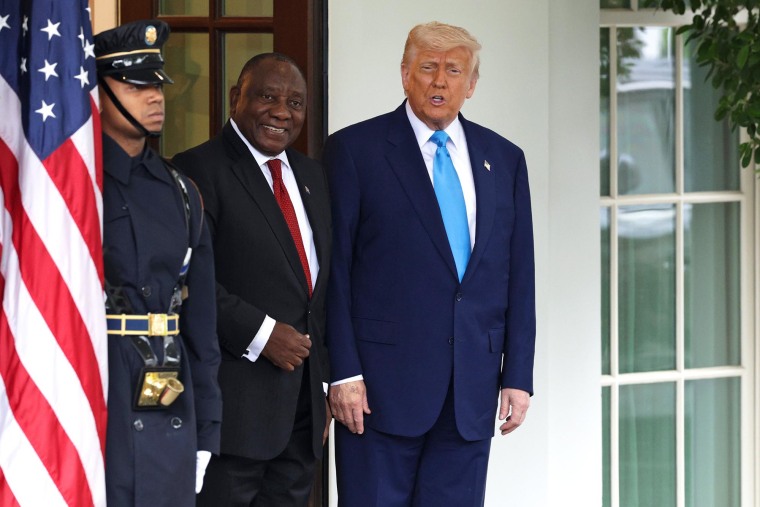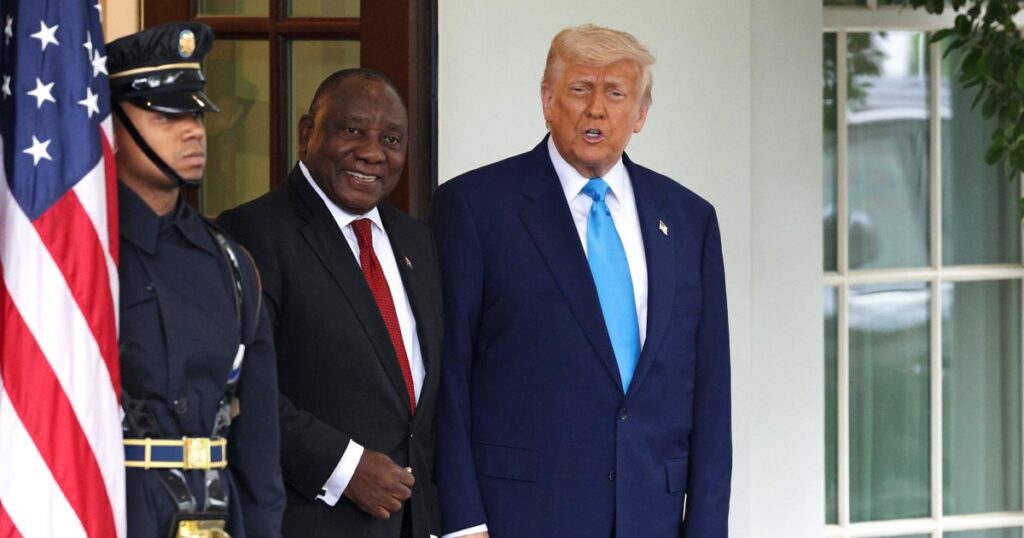WASHINGTON — What started as a friendly first meeting between President Donald Trump and South African President Cyril Ramaphosa quickly devolved after Trump was asked about the U.S. decision to admit dozens of white South Africans as refugees.
Trump asserted that there was a genocide against white people in South Africa, which Ramaphosa and other South Africans have vigorously denied.
After being asked about his genocide claims, Trump paused reporters’ questions to play a video on a television in the room depicting a montage of clips that he argued backed up his claims.
Ramaphosa responded to the montage, saying that people’s comments in the videos “is not government policy.”
“We have a multi-party democracy in South Africa that allows people to express themselves,” he said.
Asked whether he denounced the language of people in the video, Ramaphosa said “oh, yes.”
When asked by NBC News earlier in the meeting about the White House’s decision to admit white South Africans, Trump alleged that “a lot of people are very concerned with regard to South Africa” and made false allegations about a genocide in the country.
“We take from many, many locations, if we feel there’s persecution or genocide going on,” Trump said.
Elon Musk, who was born in South Africa, joined Wednesday’s meeting alongside several Cabinet officials. Musk has been a staunch critic of his birth country.
Trump and Musk have falsely claimed that the Afrikaners, white descendants of Dutch and French settlers, were targets of a “genocide.” The administration admitted 59 white South Africans as refugees this month after they claimed they were fleeing violence and discrimination. South African leaders have fiercely disputed the genocide claims.
“We all know as South Africans, both Black and white, that there’s no genocide here,” Ramaphosa said last week in a video clip on X. “We are not genocidal. We are not committing any act of hatred, act of retribution or violence against anyone.”

The leaders’ Oval Office meeting kicked off with Trump saying that Ramaphosa was “a little bit less respected” by some.
“He is a man who is, certainly, in some circles, really respected,” Trump said of Ramaphosa. “Other circles, a little bit less respected, like all of us, in all fairness.”
Ramaphosa responded, “We’re all like that,” laughing.
Ramaphosa told reporters Tuesday that his visit Wednesday would focus on potential trade and investment deals, as well as aim to “consolidate good relations between our two countries.”
Trump has accused South Africa of being “terrible” to farmers, and in February, he said the United States would cut off aid to the country, alleging on Truth Social that South Africa was “treating certain classes of people VERY BADLY.”
There were 12 murders on farms last year, The Associated Press reported, citing police statistics. One of the victims was a farmer, and the rest were farmworkers, none of whom were identified by race, according to the AP. White farmers own roughly three-quarters of South Africa’s privately owned land, according to government data.
The White House has also criticized South Africa’s 2024 Expropriation Act, which allows the government, in some cases, to seize unused land without compensation or when there is public interest in redistributing it (a process similar to eminent domain laws in the United States.)
Ramaphosa said in February that his government has not confiscated land.
“The recently adopted Expropriation Act is not a confiscation instrument, but a constitutionally mandated legal process that ensures public access to land in an equitable and just manner as guided by the constitution,” he said on X.
Still, the White House claimed that the law was a “shocking disregard of its citizens’ rights” and alleged that it followed actions “fueling disproportionate violence against racially disfavored landowners.”
The administration used the act to prioritize refugee admission and resettlement for the Afrikaners, even as the Trump administration has shut down admitting refugees from most other countries, including Afghanistan, Sudan and Myanmar.
One of Trump’s executive orders on his first day in office suspended the refugee admissions program, arguing that the country was not able to “absorb large numbers” of migrants and refugees in a way “that does not compromise the availability of resources for Americans, that protects their safety and security, and that ensures the appropriate assimilation of refugees.”
Afrikaners are minority white descendants of Dutch and French settlers who ruled the country during the apartheid regime, which ended in 1994. During apartheid rule, Afrikaners enforced racial segregation and confiscated land from Black residents.
The X account for South Africa’s government posted in February that “we look forward to engaging with the Trump administration over our land reform policy and issues of bilateral interest.”
“We are certain that out of those engagements, we will share a better and common understanding over these matters,” the post continued.
Musk has also claimed that Starlink, his satellite internet service, is “not allowed to operate in South Africa, because I’m not Black.” Starlink would need certain licenses to operate in the country, and South Africa has regulations designed to ensure that a portion of foreign-owned telecommunications licenses are sold to historically disadvantaged groups.
The U.S. and South Africa have also butted heads over the Israel-Hamas war, after South Africa accused Israel of committing genocide against Palestinians in Gaza. South Africa is leading a case in the United Nation’s International Court of Justice.
The White House referred to the genocide allegations in Trump’s February executive order centering on Afrikaner refugees, saying that “South Africa has taken aggressive positions towards the United States and its allies.”

